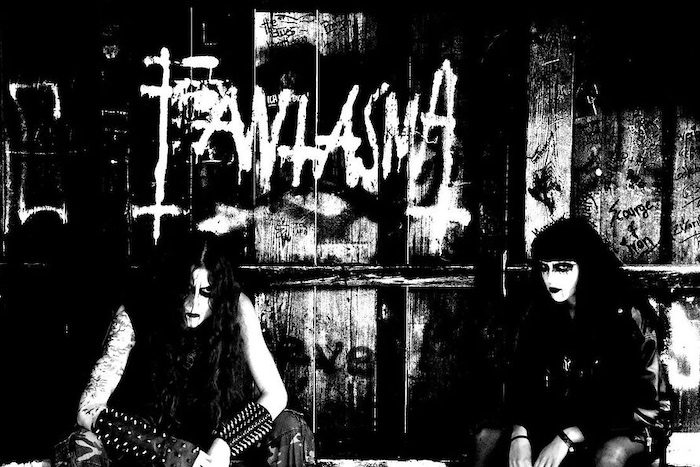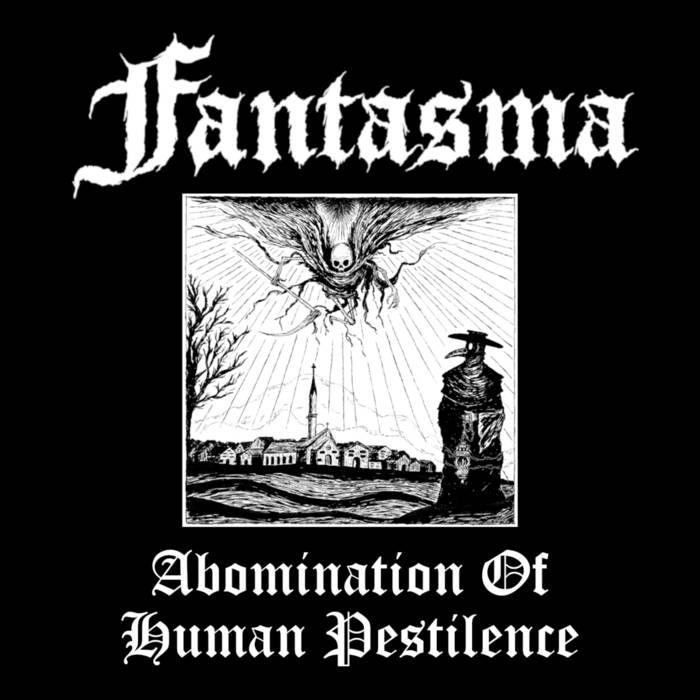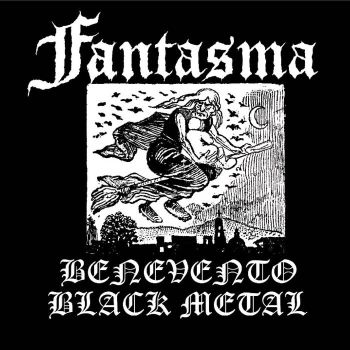Fantasma - Interview
Over the years, I was lucky to have met a lot of young and passionate black metal musicians from all over the globe who share similar views on music, and in fact I still do come across some more amazing people as time goes by. One of the people which I met last year in person, and have been in contact ever since, is a musician who hails from Würzburg, Germany, by the name of Michael Schneider, aka Sarto. Sarto is a member of various bands such as Fantasma, Morgenröthe and Tristețe, and he is also a live/session guitarist for Totensucht, Wehmut and even Bethlehem as of 2023. No matter whether he is involved as a full-time member or a session member, one can't deny the fact that he constantly remains active and his dedication is something that I highly admire about him. Join me on this journey as I exchange words with Sarto regarding his upbringing in the German black metal scene, the latest demo of his project Fantasma, him joining Bethlehem as a session musician, and many other things along the way.
Vladimir

Greetings Sarto! The MetalBite crew wishes you a warm welcome. How are you doing brother?
Хвала, брате. Can't complain, hope everything's good at your end as well.
Before we start discussing some of your works, we'd like to know a bit about you and your overall musical background. What can you tell us about yourself and your upbringing in the German black metal scene, including the black metal genre itself?
Well, I have been listening to black metal since I was eight years old or so. So, after eight, nine, ten years or so, when I grabbed up guitar and bass seriously for the first time, it had to be black metal. The thing is that I never really had a lot of contact with people who listen to this type of music or even play it because they just didn't exist in my place. That made it a bit difficult in the beginning, but it changed positively with age and places. Music-wise I have to admit that I never really listened a lot to German black metal. I grew up rather listening to French black metal bands especially but of course also to others from Scandinavia and where not. By this I mean I was not necessarily focused or influenced by German black metal in a special way.
Your musical reputation consists of various bands, including your involvement as a live/session guitarist in bands such as Totensucht, Wehmut and even in the well-known band Bethlehem as of 2023. What is it like to actively work in so many bands as either a full-time member or as a session musician? How do you manage to balance out everything in order to work both ways?
It's the same like with everything else. You only have 24 hours per day, and you must set priorities. For me, making music et cetera apart from just being a fan developed into a great priority, if not even a necessity. To be honest, it's not that simple because you still need time for your university in my case, part-time job, family et cetera but here's the thing: none of my bands or projects are like those that are on big tours all the time. If that'd be the case, it wouldn't be manageable. So, we have a few concerts here and there with some, with others it's now only studio work. Somehow it works out but to be completely honest, I couldn't do more and thought often enough of reducing the responsibilities. But somehow you still stick to it because it's passion. As long as a project or a band doesn't suffer from me not being able to take my responsibility, I'm trying to stick to it.
Can you also tell us a bit about how you became a live guitarist of Bethlehem and how did you feel when you became a part of such a big and respected name in the German black metal scene?
Me and Jürgen met in 2019 at a festival. We stayed in contact since and once he told me that he needed another guitarist for Bethlehem, we decided that I could help out. Of course, I feel very good about it, especially because Bethlehem is also one of my all-time favorites. In the end it's all about the music and I'm happy to be part of this and to be able to help out a friend's band.
So far, what has been your most positive and engaging experience, either as a full-time member or a session musician? Have there been any things that you managed to pick up along the way?
I think it's an experience that (hopefully) comes back with every songwriting process. It's the freedom of creating music and lyrics without limitations, maybe only with those you set by yourself. Without this freedom in my head, I couldn't make music at all. Maybe that's also the reason why I have so many different projects and ideas for upcoming projects and releases. Maybe there will be projects with only one release. But it's good for trying out stuff and dealing with different moods and so on. But I get your question, I'd say so far it was our first festival show with Totensucht at Boarstream Festival last year. That was neat.
One of your recent works includes your project Fantasma and I noticed that the debut EP "Benevento Black Metal" has song titles and a couple of lyrics in Italian language. What is the story behind the project and the use of Italian language? Are there any influences in particular?
I have a close connection to Italy, have been there many times and have some very good friends there, for which I'm very grateful. I remember that I was visiting friends in Campania in 2021, and I still didn't have any lyrics or a band name in mind, only the images in my head when I was writing the music. So, I came up with "Benevento Black Metal" as a title while being in the city and the surrounding area. For the lyrics and everything else I have my imagination which I mix up with historical facts, places where I've been and the general themes. All in all, I see it as a tribute. The band name was an idea of my dear friend Leonardo, who also did the spoken word part on the song 'Benevento Black Metal'.
As of recently, Fantasma released the new demo "Abomination Of Human Pestilence", released on limited edition cassettes with a total of 66 copies via Narbentage Produktionen. How was the overall process for making this demo, including your experience on working with Agathodaimon drummer Oliver Kraus?
The reason why I wanted to start with demos instead of a full album right away was to give myself time to develop the style of Fantasma. The second demo is a bit different, so I needed some time. In general, I can say that it took quite a while but last but not least thanks to the good work of the others it went pretty well. When it comes to the drums, I'm happy that Mortos recorded and improved them once again. I worked with him already before with Morgenröthe's live shows and Fantasma's first demo. He's a talented and responsible musician, I'm grateful to be able to work with him.
Another change to Fantasma alongside the new demo is that the project managed to expand and become a two-piece when Martyris joined as the second guitarist, and so the "Abomination Of Human Pestilence" also marks her official "baptism by fire" from a musical standpoint. Has this change affected Fantasma in a way to help the project work more effectively, faster and better than before?
That's a very interesting idea. In my experience, the more members, the more opinions, and problems, the slower the process. That's why I like solo projects. No but in this case it was worthwhile. It was good to have a second opinion on the music by someone who really knows the genre and add some ideas to it.
Now that you have released your new demo, were there any plans that you and Martyris envisioned to do with Fantasma in the near future?
The plan is to work on new material this year and to find a split partner to release a third cassette tape as part of the 'demo trinity'. Afterwards it's finally time for a full-length. Apart from that there aren't many plans. There might be a one-time only gig this year if we're in the mood for it. But in general, there won't be many gigs with Fantasma.
Since I met you in person last year, we had the opportunity to exchange our opinions regarding black metal bands and even the genre itself. Along the way we also spoke about the importance of good and creative songwriting in black metal, the necessity of analyzing your work from different standpoints and we also talked about some of your past experiences. I don't recall asking you this before, but what do you personally regard as good black metal and what would you consider to be an important ingredient for achieving such?
That's a very difficult question. There are many good subgenres of black metal, talking about the music itself. When it comes to black metal without considering the subgenres, I prefer the old-school sounding bands over the modern, polished ones that pop up everywhere today. Also including the subgenres, I could drop many names now, but I think that wouldn't answer your question. I think the core of 'classic' black metal, if we want to call it like that, is a certain 'fuck y'all' attitude of disappointment which arises from looking at ourselves and the people around us. That doesn't mean that good black metal must contain hate, most likely it does to a certain degree, but it's more about reflection of reality. The music helps to deal with the emotions about this reality (while or even by creating other emotions) while the lyrics describe more or less the reality itself (or should I say the 'realities' since this is all very subjective). There are 'good' bands in my personal opinion that do one of these things, only a very few can do both. Luckily, I can listen to music without bothering about the lyrics as well. Otherwise listening to many bands would seem just too stupid. To sum up, if you make great black metal music, you're a good artist. If you're even able to make it mean something, to have a special thought within it, you're a great artist. This is all very subjective, one must add, and it feels a bit bad to reply here because actually one could (maybe even should to a certain degree) do his own research on this and really think a lot about it. Maybe one could come up with ideas about it, you've never thought about before. I would like to recommend that to many 'good artists'. Especially those mindless who think black metal must necessarily be evil, hateful or satanic, just for the sake of 'being black metal'. If you think of the genre like that, you're not better than the religion you say you are disgusted by, because it's both a faith in a set of rules that you didn't create but (mindlessly) hollow.
A last question I'd like to ask you is where do you usually look for inspiration when working on your music? What do you consider as reliable sources that will always help your creativity no matter what?
I turn on the news or I leave my apartment. There's much inspiration for writing skeptical and critical music. But seriously like I said before, Italy is always a great inspiration, history and general, stories about the church and some mystical things. And then there's always the music you listen to. You are never free from this influence. If your creativity feels non-existent sometimes, take a step back, reflect and try again after a few weeks or so. Something I had to learn myself.
Thank you so much for doing this interview, Sarto! I am really looking forward to hearing more great stuff from you in the near future. Are there any final words you'd like to leave before we wrap this up?
Thanks a lot for the interview. See you soon!
Upcoming Releases
- Daidalos - Dante - Feb 20
- AmongRuins - Advent Of Chaos - Feb 20
- Soul Of Anubis - Ritual - Feb 20
- Coscradh - Carving The Causeway To The Otherworld - Feb 20
- Clawfinger - Before We All Die - Feb 20
- Exhumed - Red Asphalt - Feb 20
- Morrath - Obscure Abominations - Feb 25
- Vide - Aux Enfants Des Ruines - Feb 27
- Blackwater Drowning - Obscure Sorrows - Feb 27
- Chalice - Divine Spear - Feb 27
- Serpent Icon - Tombstone Stories - Mar 06
- Insect Inside - Reborn In Blight - Mar 06
- Triumpher - Piercing The Heart Of The World - Mar 06
- Lömsk - Act II - Of Iron And Blood - Mar 06
- The Leaving - The Leaving - Mar 06
- Monstrosity - Screams From Beneath The Surface - Mar 13
- Against I - Anti Life - Mar 13
- Empire Of Disease - While Everything Collapses - Mar 19
- Putred - Blestemul Din Adânc - Mar 20
- Diatribes - Degenerate - Mar 20


